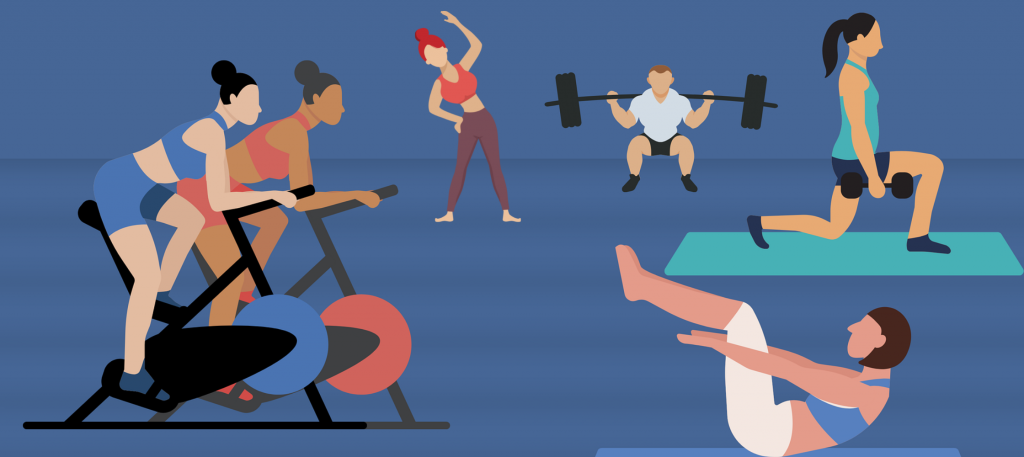
We often hear how important exercise is for our health and well-being, but did you know that exercise physiology can be particularly beneficial to women? Exercise physiology is the scientific study of the body’s response to physical activity and physical training. It is an evidence-based approach to exercise prescription, which is tailored to the individual’s needs and goals. As women, we experience different health concerns and physical challenges than men, so it is important to understand how exercise physiology can help us. In this blog post, we will explore the benefits of exercise physiology for women’s health and well-being.
NSW Women’s Health Week
NSW Women’s Week is a chance for women and girls across the state to come together to support one another, share information and celebrate women’s achievements.
NSW Women’s Week is also a time to bring our communities together to work towards gender equality. We all have a part to play in championing gender equality and making NSW a great place to live, work and succeed.
2023 NSW Women’s Week will run from 6 to 12 March and coincide with International Women’s Day on 8 March, and the NSW Women of the Year Awards on 9 March.
Introduction to Exercise Physiology
Exercise physiology is the scientific study of the body’s response to physical activity and physical training. It is an evidence-based approach to exercise prescription, which is tailored to the individual’s needs and goals. Exercise physiology focuses on improving and maintaining physical health, strength, and fitness through exercise. It takes into account the individual’s age, gender, health status, and lifestyle. Exercise physiologists can develop and implement exercise programs tailored to the individual’s needs and goals.
Exercise physiologists are trained professionals who are qualified to assess, develop, and implement exercise programs. They are knowledgeable in the physiology of exercise and the body’s response to physical activity. They are also knowledgeable in the principles of anatomy, physiology, and biomechanics. Exercise physiologists are able to evaluate the individual’s health and fitness and develop an exercise program that meets the individual’s goals.
Women’s Health and Exercise physiology
As women, we experience different health concerns and physical challenges than men, so it is important to understand how exercise physiology can help us. Exercise physiology is an evidence-based approach to exercise prescription, which is tailored to the individual’s needs and goals. Exercise physiologists can help women to improve their overall health and fitness, manage chronic conditions, and reduce the risk of developing certain diseases.
Exercise physiologists have a deep understanding of the physiological differences between men and women. They are able to develop customized exercise programs that are tailored to the individual’s needs and goals. Exercise physiologists can also help women to understand how to incorporate physical activity into their daily lives, and how to make healthy lifestyle choices.
Exercise Physiology and Endometriosis
Endometriosis is a chronic and painful condition that affects the reproductive organs of women. It is estimated that up to 10% of women of reproductive age suffer from endometriosis (1). Exercise physiology can help women with endometriosis to manage their condition, reduce their pain, and improve their quality of life (2).
Exercise physiologists can develop an exercise program that is tailored to the individual’s needs and goals. They can help women to strengthen their core and pelvic floor muscles, improve their flexibility, and increase their overall strength and endurance. Exercise physiologists can also provide guidance on how to best manage symptoms of endometriosis, such as fatigue, pain, and bloating.
Exercise Physiology and PCOS
Polycystic ovary syndrome (PCOS) is a common endocrine disorder that affects up to 10% of women of reproductive age (3). Women with PCOS often experience irregular menstrual cycles, acne, excessive hair growth, and infertility. Exercise physiology can help women with PCOS to manage their symptoms, reduce the risk of developing certain diseases, and improve their overall health and well-being (4).
Exercise physiologists can develop an exercise program that is tailored to the individual’s needs and goals. They can help women to improve their strength, flexibility, and cardiovascular fitness. Exercise physiologists can also provide guidance on how to best manage symptoms of PCOS, such as weight gain, fatigue, and hirsutism.
Exercise Physiology and the Menstrual Cycle
The menstrual cycle is a normal physiological process that occurs in women of reproductive age. Exercise physiology can help women to understand their menstrual cycle and how physical activity can affect it (5). Exercise physiologists can provide guidance on how to best manage the symptoms of the menstrual cycle, such as bloating, fatigue, and cramps. They can also help women to understand how physical activity can help to improve their overall health and well-being.
Exercise physiologists can develop an exercise program that is tailored to the individual’s needs and goals. They can help women to improve their strength, flexibility, and cardiovascular fitness. Exercise physiologists can also provide guidance on how to adjust physical activity levels throughout the menstrual cycle.
Exercise physiology and menopause
Menopause is a natural physiological process that occurs in women as they age. Exercise physiology can help women to manage the symptoms of menopause, such as hot flashes and night sweats (6. Exercise physiologists can develop an exercise program that is tailored to the individual’s needs and goals. They can help women to improve their strength, flexibility, and cardiovascular fitness. Exercise physiologists can also provide guidance on how to adjust physical activity levels throughout menopause.
Exercise physiologists can also provide guidance on how to best manage the symptoms of menopause, such as fatigue, mood swings, and insomnia. They can help women to understand how physical activity can help to improve their overall health and well-being.
Exercise Physiology and Life Stages
As women, we go through many different life stages. Exercise physiology can help us to understand how physical activity can help us to manage our physical and mental health needs throughout these different life stages. Exercise physiologists can provide guidance on how to adjust physical activity levels throughout each life stage, such as adolescence, pregnancy, postpartum, and menopause.
Exercise physiologists can also provide guidance on how to best manage the physical and mental health needs of each life stage. They can help women to understand how physical activity can help to improve their overall health and well-being.
Exercise Physiology and Behavioral Health
Behavioral health is an important aspect of overall health and well-being. Exercise physiology can help women to manage their mental health needs, such as depression, anxiety, and stress. Exercise physiologists can develop an exercise program that is tailored to the individual’s needs and goals. They can help women to understand how physical activity can help to improve their overall health and well-being.
Exercise physiologists can also provide guidance on how to best manage the symptoms of behavioral health conditions, such as mood swings, sleep disturbances, and fatigue. They can help women to understand how physical activity can help to manage these symptoms and improve their overall mental health and well-being.
Exercise Physiology and Nutrition
Nutrition is an important aspect of overall health and well-being. Exercise physiology can help women to understand how nutrition and physical activity can work together to improve their overall health and well-being. Exercise physiologists can provide guidance on how to best manage the nutritional needs of each life stage. They can help women to understand how to make healthy food choices and how to incorporate physical activity into their daily lives.
Exercise physiologists can also provide guidance on how to best manage the nutritional needs of various medical conditions, such as endometriosis and PCOS. They can help women to understand how nutrition and physical activity can help to manage the symptoms of these conditions and improve their overall health and well-being.
Conclusion
Exercise physiology can be a powerful tool for women’s health and well-being. Exercise physiologists are trained professionals who are qualified to assess, develop, and implement exercise programs tailored to the individual’s needs and goals. They are knowledgeable in the physiology of exercise, the body’s response to physical activity, and the principles of anatomy, physiology, and biomechanics. Exercise physiologists can help women to manage their health conditions, reduce their pain, and improve their overall health and well-being.
Are you a female looking to find the right exercise for your stage of life? Chat with us at MBXphys.com.au today! Exercise physiology can help you to understand how physical activity can help you to manage your physical and mental health needs and improve your overall health and well-being.
Citations:
(1) https://www.endometriosis-uk.org/endometriosis-facts-and-figures
(2) https://www.ncbi.nlm.nih.gov/pmc/articles/PMC5890212/
(3) https://journals.lww.com/alzheimerjournal/fulltext/2007/07000/
are_women_with_polycystic_ovary_syndrome__pcos__at.12.aspx
(4) https://myphysiosa.com.au/exercise-its-role-with-polycystic-ovarian-syndrome/
(5) https://www.ncbi.nlm.nih.gov/pmc/articles/PMC7916245/
(6) https://www.ncbi.nlm.nih.gov/pmc/articles/PMC3296386/Words: 1423








